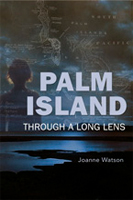Palm Island: Through a long lens
Summary
In November 2004, Mulrunji Doomadgee’s tragic death triggered civil unrest within the Indigenous community of Palm Island. This led to the first prosecution of a Queensland police officer in relation to a death in custody.
Despite prolonged media attention, much of it negative and full of stereotypes, few Australians know the turbulent history of ‘Australia’s Alcatraz’, a political prison set up to exile Queensland’s ‘troublesome blacks’.
In Palm Island, Joanne Watson gives the first substantial history of the island from pre-contact to the present, set against a background of some of the most explosive episodes in Queensland history.
The repressive regimes were under the guise of protectionism. But police control continues, and there is a continuing failure to address the causes of ongoing Indigenous disadvantage.
Palm Island, often heart-wrenching and at times uplifting, is a study in the dynamics of power and privilege, and how it is resisted.
Dr Joanne Watson is a writer and teacher in Australian social history and health. She currently teaches Indigenous students vocational education in the Logan area. Joanne has worked with Indigenous communities for three decades and undertook extensive archival and oral history research on Palm Island. Watson’s long-standing connections with the Palm Island community allow her to present community perspectives of a history from pre-contact to the present.
Reviews and endorsements
'This is an outstanding contribution to Indigenous history — especially the history of Palm Island. Watson has made great use of historical records, media reports, discussions with Palm Island people alive today, and historical recollections from family members.'
— Stephen Hagan, University of Southern Queensland
'This book is essential reading if we are to confront and understand Queensland's shameful record of Aboriginal removal and segregation, and the profound deformation of human rights it bequeathed to the Australian nation during the twentieth century. Joanne Watson, with an astute combination of exhaustive research, insight and empathy, has encapsulated here the entire tragedy of Palm Island, as well as the inspiring capacity of those caught and imprisoned within this history to confound and transcend it.'
— Dr Raymond Evans, Adjunct Professor with the Centre for Public Culture and Ideas, Griffith University
'Palm Island: Through a long lens is a masterly rendition of historical facts, situating 90 years of blighted government and erratic officials within the movement towards Indigenous rights during the twentieth century. Anchored firmly in the knowledges and experiences of Palm Islanders through the decades, this book illuminates not only their hellish existence under government controls, but their unquenchable spirit and unflinching determination to prevail.'
— Dr Rosalind Kidd
'Joanne Watson captures the spirit and history of Palm Island in a way that helps make sense of the past and the present and also provides important pointers for the future. Understanding the full detail of the trauma and pain that many people have endured on the island over many decades is crucial to the process of recovery. For those of us who only hear about this remote tropical island when shocking events give it 'news value', Joanne Watson's detailed research and oral history fills many gaps. The shameful policy that created Palm Island has an enduring legacy, yet the warmth and humanity that percolates through this story is a remarkable testament to the capacity of people to survive and prevail. Understanding the past is the essential first step to making the future.'
— Dr Julianne Schultz AM, Editor Griffith Review
